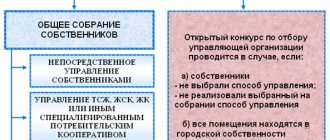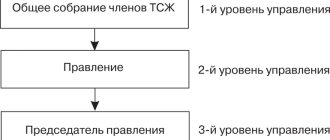Whether it would be better to choose a homeowners' association (HOA) as a form of management of an apartment building (MKD), or to prefer a housing construction cooperative (HBC), depends primarily on whether it is planned to first build a house together, or whether we are talking about already ready. For the first case, a cooperative was invented, and for the second, a partnership is suitable. And both options are useful if the owners plan to manage the house themselves, otherwise it is better for them to turn to the services of a management company.
Basic Concepts
In addition to the management of apartment buildings by professionals from management companies specifically designed to deal with this, residents themselves can take it into their own hands by forming their own organization. Most often this is an HOA, but there is another option - a housing cooperative. Of course, there are differences between them that make one organizational form preferable and some another.
It is a non-profit association, functioning as a legal entity, having a clearly structured internal structure and governing bodies: a general meeting in charge of the most important issues, and for current affairs, electing a board and chairman from among the members of the partnership, and an audit commission to check their work.
An HOA is formed by the decision of the owners if they want to manage the joint property themselves, without relying on the management company. It is created at a general meeting of owners if the majority of the total composition votes for it - which means that not all homeowners in the house may be in the partnership, but the majority of them must be in it, otherwise the HOA will not have the rights to manage it.
After the creation of the HOA, it will deal with the economic issues of the apartment building and the management of common property. And unlike the housing cooperative, the HOA is created after the ownership of the house has been formalized.
Organized for the purpose of building housing and then operating it. There have been many scandals with housing cooperatives related to their bankruptcy, as a result of which buildings simply remained unfinished, and members of cooperatives lost money. This happened due to the imperfection of legislation in this area, which is why in recent years it has been refined in the direction of tightening so that there are no loopholes for the so-called construction pyramids and other ways of deceiving citizens.
But this tightening, in addition to the positive effect, has also led to the fact that housing cooperatives have become more difficult to organize, and now this form can in many ways be considered outdated. So, if in the early 2000s the share of houses built with the help of housing cooperatives was about 5%, now, according to various sources, it ranges from 0.5 to 1%.
New housing cooperatives have practically ceased to form, but many of those that formed earlier and successfully completed the main task - building a house, continue to function, managing it.
Legal aspect
Both HOAs and housing cooperatives must work in accordance with the legislation of the Russian Federation, and the main document regulating their activities is the Housing Code. It discusses in detail how these organizations should be created, function, and be controlled by residents.
Section 6 of the code is devoted to the HOA, which includes 18 articles, which discuss all the main nuances of the functioning of this form of management of apartment buildings, from preparation for its creation, to checking the work of the board by the audit commission, replacing the board with residents, reorganization and dissolution of the HOA.
Housing cooperatives are fully devoted to Section 5 of the Housing Code, which includes Articles 110-134, which also discusses almost all the important details related to this form of management and the legal status of members of cooperatives. Such an abundance of articles allows us to say that in ordinary cases it is enough to focus specifically on the housing complex, which comprehensively describes all the main situations associated with both HOAs and housing cooperatives.
But their activities are also regulated by the Civil Code and a number of other legislative acts, which usually do not need to be specifically addressed. In addition to external regulation, both the partnership and the cooperative must have their own charters, containing additional important provisions relating to them - the charters are written and adopted by the members of these organizations themselves, so this can be called self-regulation. The charters should not contradict the law, but otherwise they may contain a variety of instructions beyond those given in the Housing Code.
Definition of concepts
Homeowners Association (HOA)
A homeowners' association (HOA) is a non-profit institution , which is based on a voluntary association of owners of real estate: premises in an apartment building (MKD) or in several buildings, country houses, country land plots.
The task of the organization is to jointly own, use, conduct business activities, dispose of property (things) that, by force of law, are in common ownership or for common use, as well as to achieve other goals provided for by law.
An HOA is formed by the decision of owners who wish to manage their property independently , without relying on a management company. An HOA is formed at a general meeting of owners if more than half of the owners of the premises plus one vote vote for this form of management. Otherwise, the HOA will not have management rights.
Housing cooperatives (housing complexes and housing cooperatives)
A housing and housing construction cooperative (HC and HBC) is recognized as a voluntary association of citizens and (or) legal entities, on the basis of membership, in order to meet the housing needs of citizens, as well as manage an apartment building.
Part 1 of Article 110 of the Housing Code of the Russian Federation does not define the difference between a housing cooperative and a housing construction cooperative, but there is a difference between them.
Members of the housing cooperative participate in the construction, reconstruction and subsequent management of the house , while members of the residential complex purchase an already built house, subsequently only dealing with its maintenance and repairs, if such a need arises. A common characteristic of these organizations is the management of small apartment buildings.
Management company (MC)
A management company (MC) is a commercial organization, a legal entity engaged in the management of property of individuals and legal entities transferred in accordance with a trust management agreement. The activities of management companies are regulated by Article 161 of the RF Housing Code.
MKD management forms
Homeowners in apartment buildings can choose their preferred form of management. True, the housing cooperative cannot be chosen after construction; a choice should be made in its favor at an early stage - but otherwise the choice is free.
There are several options:
- Management Company;
- HOA;
- direct control;
- Housing cooperative.
The choice can often be difficult for property owners as all options have advantages and disadvantages. So, if you turn to the services of a management company, then its specialists will completely take over matters related to apartment buildings, and apartment owners will not have to worry - just gather for annual meetings to learn about the work done during this period. And not everyone bothers themselves like that.
Employees of the management company can pursue their own interests that run counter to the interests of the residents of the apartment complex: sign unfavorable contracts for them, reduce the quality of service, save on purchased materials and landscaping of the local area.
It turns out that the disadvantage of this form, which for some is an advantage, is the small participation in the management of the residents themselves, which boils down to changing the management company if the work of that company has become very bad. And even that is difficult to do, since residents are usually disorganized and are accustomed to letting things take their course.
For houses with more organized and active residents, if they have experience in management, an HOA is better suited. Having organized a partnership, they will manage the apartment building themselves - they will have to decide on their own the signing of contracts with suppliers, carrying out repairs, landscaping the territory and other issues. This will allow you not to spend money on wages for the management company’s employees, and in general this form shows itself to be more economically efficient. However, not always, but only if the board of the partnership copes well with its tasks - for this it must consist of competent people who are ready to spend their time on this.
With direct management, no board is elected by the residents at all, and there is no management structure - all residents take on the functions that in previous versions were performed by the management company and the HOA. Therefore, direct control is used only in small houses, where there are few apartments - preferably within a dozen. In large ones it shows itself to be ineffective; in them, in any case, a clear organizational structure is required.
Housing cooperatives unite to build an apartment building, but then the cooperative can also engage in its operation. All its members will participate both in the construction and in the subsequent management of the house; in general, its structure is similar to a partnership - it also has a charter, a board, and an audit commission.
But if not all owners of apartments in a building may be part of a partnership, a majority is sufficient, then the members of the housing cooperative are everyone who owns living space in an apartment building. After all, here the principle is the opposite, and first a cooperative is formed, and the house is built with its efforts. At the same time, the number of members of the cooperative cannot exceed the number of individual premises whose construction is planned. Note that in addition to housing cooperatives, there are also residential complexes - the absence of the letter “c” here indicates the fact that such cooperatives do not engage in construction, but purchase housing and then manage it.
Main differences
And despite all the similarities, there are a number of features between HOAs and housing cooperatives regarding the goals, the organizational and legal form used to achieve them, and, as a consequence, the membership model. They also have different restrictions when conducting business activities. You should consider the differences between HOAs and housing cooperatives in more detail in order to make an informed and informed choice between them, if necessary.
Purpose of creation
In the future, after construction, it can also be involved in its management. The purpose of creating an HOA is to manage an apartment building; it is not involved in the construction of residential buildings.
Organizational and legal form
The housing cooperative management has the following structure:
- the meeting of owners is the main decision-making body, but if the cooperative has more than fifty participants and the corresponding clause is in the charter, then a conference is held;
- board – elected by the meeting of owners;
- Chairman - selected from among the members of the board either by the board itself or by a meeting of owners;
- is not built into the board structure, but must be checked externally by an audit commission.
In this regard, the structure of the HOA is practically no different, except for a couple of nuances: the absence of a conference, and also the fact that the HOA has a chairman, but is not formally included in the management bodies.
The most important difference is that the LCD regulates in detail procedural issues, as well as the rights and obligations of HOA members, but for cooperatives there is no such detailed regulation. This means greater freedom of maneuver in the housing cooperative charter compared to the HOA charter, and much broader opportunities for determining the procedure for making decisions.
Another difference is that in a housing cooperative, each participant has one vote, but in an HOA, votes are counted based on the share of the citizen’s living space in the total area of the house, therefore, the weight of the votes will vary.
The voting itself in housing cooperatives must be open; there is no provision for the possibility of conducting it secretly or in absentia - in HOAs it is.
If apartment buildings can come under the control of a homeowners association, and the partnerships themselves can merge with each other, then in the case of housing cooperatives the status is fixed. An already constructed house cannot come under the control of a housing cooperative operating in a neighboring building, or even a newly formed one of its own; two housing cooperatives cannot be combined into one.
Organization membership
In a housing cooperative, the minimum number of members is 5 people, the maximum is limited by the number of residential premises in the building. When a housing cooperative is formed, all future owners of living space in the house will be members of it - after all, the cooperative is created for its construction. That is, a housing cooperative must be formed with the full consent of all citizens who will build a house, and everyone will become a founder.
In this regard, different principles apply to the partnership due to the fact that it is formed in an already completed building - it is enough for more than half of the owners to join it so that the HOA can begin to manage the building. As for leaving organizations, he is free in both cases.
Economic activity
Both HOAs and housing cooperatives are non-profit organizations. However, their status in this regard cannot be called equal. If organizations receive income from economic activities, then the HOA can use these funds exclusively for certain needs of the apartment building, but for housing cooperatives the opportunity to distribute income among the members of the cooperative in equal shares is available.
Thus, the housing cooperative actually occupies an intermediate position between a non-profit and a commercial organization, and the rules established in Federal Law No. 7 “On Non-Profit Organizations” do not apply to it. Instead, housing cooperatives are subject to the provisions of the Civil Code on consumer cooperatives.
Choosing an organizational form
All organizational forms have pros and cons, and each manifests itself most effectively in certain circumstances, so the main thing is to take these circumstances into account and make the right choice based on them. To do this, you should focus on a set of criteria.
At the same time, we note that the main choice is often between the management company, on the one hand, and the housing cooperative or HOA, on the other. Since the last two organizations are similar in many ways, and the main difference between them is the original purpose for which they are created, there is usually no choice here. If you need to first build a house, then it’s a housing cooperative, and if you just need to manage an existing one, it’s a homeowners’ association.
Criteria
The first criterion is the goal pursued by the organization. The housing cooperative allows one set of actions, the HOA another, the management company a third, and let’s not forget about direct management. Based on what actions the residents are ready to take with the apartment building, what amount of authority they intend to entrust to professionals and not deal with it themselves, it is worth choosing an organizational form.
Other criteria are directly related to this - the initiative and competence of residents in matters of managing apartment buildings. If no one is ready to take responsibility and spend time on MKD affairs, or does not have the appropriate skills, then it will be difficult in an HOA, and even more difficult in a housing cooperative. In such cases, the cases are transferred to the management company.
An important factor is the size of the house. If it consists of several apartments, then direct management will be an effective form; if it is large, a structured structure will be required.
The presence of additional income-generating objects - for their operation and distribution of income, it is convenient to preserve the housing cooperative; otherwise, it may be easier to dissolve the cooperative and create an HOA, or switch to direct management.
To manage apartment buildings, various types of associations of people who live in such buildings or own residential or non-residential premises are created. Quite common forms of management organizations include homeowners' associations (HOAs) and housing-construction cooperatives (HBCs).
A homeowners' association is currently the most common form of management of an apartment building, which involves the provision of services for maintaining common property in one or more buildings. This form is regulated by the provisions of the Housing Code of the Russian Federation.
This article talks about typical ways to resolve the issue, but each case is unique. If you want to find out how to solve your particular problem, call :
- Moscow .
- Saint Petersburg .
- Regions.
Or on the website. It's fast and free!
A housing construction cooperative is also a form of management of an apartment building. However, this form of management is created even at the stage of construction of a specific house, since in accordance with the current legislation (with the exception of the Housing Code of the Russian Federation) it is taken into account as a developer.
Other Features
A homeowners' association is not the only association that can take care of the maintenance of an apartment building in addition to the management company. But such organizations have their own purpose and features that distinguish them from each other.
Housing and communal services or HOA
Housing and communal services is an organization whose competence includes the construction, repair and maintenance of multi-apartment buildings.
The only difference between housing and communal services and HOAs is that housing and communal services are on the balance sheet of the state .
But the partnership can take on the role of housing and communal services.
If a building has its own association, then all residents are obliged, for example, to pay utility bills through it.
Housing cooperative or homeowners association
The difference between these two associations is that a housing construction cooperative arises during the construction phase of a building.
Whereas an HOA can only be organized in a residential building. The activities of the housing cooperative are aimed at the timely construction of the house; in addition, there is a practice of share contributions.
That is, future residents have rights and obligations based on their contributions.
In the case of a homeowners' association, all residents are already owners, not shareholders . The partnership collects money not for construction, but for repairs or other needs.
HOA or TSN
A real estate owners' association implies that its members can be owners of not only residential premises, but also various buildings .
The functional differences between HOAs and TSNs are insignificant, since the activities of both organizations are aimed at maintaining common property. However, there are differences.
First of all, they relate to making a profit from the use of non-residential buildings . But HOA members most often only engage in repairs or improvement of residential premises.
The next difference is the status of members of associations. A homeowners' association accepts only residents of a specific building, while legal entities can join TSN. TSN is preferable when there are commercial buildings on the territory .
Similarities and differences between housing cooperatives and homeowners' associations
| Reasons for comparison | Housing and construction cooperative | Homeowners Association |
| Purposes of creating the association | Created for the construction of a specific house and its subsequent maintenance, including in terms of common property | Can be created only to service the common property of an apartment building or a group of such buildings |
| Number of participating members | A housing cooperative is recognized as complying with the requirements of current legislation if the number of its members is at least five, and it must include all owners of premises in an apartment building | To recognize the existence of an HOA as legitimate, it is required that it consists of at least fifty percent of the owners of premises in an apartment building. At the same time, an HOA can merge several apartment buildings, subject to the consent of all its participants |
| Regulatory regulation | Regulatory regulation of the activities of both HOAs and housing cooperatives is carried out only in accordance with the Housing Code of the Russian Federation and regulations adopted in its implementation at various levels of subordination (from federal to municipal) | |
| Carrying out commercial activities and distributing its results | Since the housing cooperative is a commercial legal entity, any result of financial activity that allows obtaining a certain amount of profit must be divided among all members of the cooperative in accordance with their shares of participation in the authorized capital of the legal entity | Although an HOA is recognized as a legal entity that has the right to conduct commercial activities (for example, renting out existing common property), however, profit due to the legal features of its functioning cannot be divided among the members of the HOA. All profits received are directed towards solving existing expenses or accumulated in special accounts of the organization for the purpose of further allocation to resolve emerging needs. |
| Contributions to the capital of a legal entity and obtaining property rights | In the case of full or partial payment of the share contribution provided for by the statutory documents of the housing cooperative, it is possible to obtain property rights, for example, ownership rights to residential or non-residential premises located in an apartment building. Contributions can be paid both during the construction of the house and after its completion. Full right of ownership and disposal, that is, classical ownership, arises only after share contributions have been paid in full for a specific property | Contributions are regular and are made in accordance with the payment schedule defined by the statutory documents. At the same time, the implementation of such contributions, even in full, does not entail property rights, since these contributions are directed towards the formation of a fund that ensures the functioning of the HOA itself and the contractors it hires |
| Transformation of housing cooperatives into HOAs and back | A housing cooperative into a HOA can be transformed based on a decision of the general meeting of owners of premises in an apartment building, and the procedure must be fully implemented with notification of all government bodies | Impossible, since the HOA cannot engage in the construction of apartment buildings. This is due to the purposes of creating such a legal entity. A housing cooperative can only be created with the participation of members of the HOA if a decision is made to build another apartment building that meets the requirements for a cooperative |
| Procedure for creating a legal entity | The procedures are similar, since all stages go through from the announcement of the constituent meeting, at which the decision to create a legal entity is made, to the registration of the formed legal entity with the state authorities. The list of documents used also does not differ, since in order to register both legal entities, you will need to provide statutory documents, as well as documents for the leaders of the association being created | |
| Board members and chairman | The members of the board and the chairman are selected from among the owners of premises in the apartment building. Information about the chairman as the head of the organization is entered into the Unified State Register of Legal Entities. The position of the chairman most often has the character of an actual acting one, since he is assigned a large number of rights and responsibilities recorded in the Charter of the organization | Board members are selected from among the owners of premises in an apartment building. The chairman is also selected from among the board, however, the position is nominal in nature, since the main rights and responsibilities fall entirely on the shoulders of a specially hired manager. However, data on the chairman as the head of the legal entity being created is entered into the Unified State Register of Legal Entities |
| Responsibility for financial obligations in case of their violation | Creditors have the right to apply to the members of the housing cooperative for repayment of existing debts, since the authorized capital consists of the share contributions of the members of the cooperative. However, foreclosure can only be applied to that part of the share that has not been paid | Even if there are large debts, they can be collected by creditors and resource supply organizations only from the legal entity itself. It is strictly prohibited to impose penalties on members of the partnership |
What to choose: HOA or UK?
Considering that each of the described control methods has both advantages and disadvantages, making the right choice can be difficult. There are no big differences in the content of the responsibilities of HOAs and management companies. In fact, there is a difference in the order in which it is carried out.
There is no consensus on what is better in practice. But most often, owners use the services of some kind of management company - up to 80% choose this particular form of managing an apartment building.
Someone talks about the advantages of an HOA as a non-profit association created in the interests of residents. Others talk about convenience for residents and the professional basis of the activities of management organizations.
Still others agree that it is best to combine these two methods, that is, create an HOA that already enters into an agreement with the management company. This will combine their advantages and reduce possible disadvantages.
When asking the question of what is better for managing a home by an HOA or a management company , owners must take into account the features of the houses to be maintained and the specifics of a particular management method.
The responsibility for maintaining apartment buildings and managing common property rests with the homeowners. In accordance with current legislation, they independently select the organization that will deal with issues related to maintenance.
When answering the question, what is the difference between an HOA and a management company, it is worth considering their definitions. Thus, an HOA is a non-profit organization whose actions are determined independently by the residents of the house. For each issue, a general meeting is convened, at which more than 50% of apartment owners must be present.
The homeowners association consists of 3 groups:
- General meeting of residents.
- The elected official is the chairman, the composition of the management.
- A commission with supervisory functions.
The management company is a commercial organization registered as a legal entity. She specializes in providing home maintenance services and managing common property. Homeowners are required to pay monthly payments according to receipts.
In other words, the management company is an intermediary between the owners of residential space and utility service providers. The organization may act as a subcontractor if third-party companies are hired to carry out repairs or other work.
The procedure for transforming a housing construction cooperative into a homeowners' association
If the owners of premises in an apartment building have decided that there is no longer a need for a housing construction cooperative, they can create any form of management. The most important stage in the transformation of housing cooperatives into HOAs will be the holding of a constituent meeting.
constituent Assembly
This meeting must be prepared in advance. A notification about its holding is placed in places where information is provided in advance in order to inform all members of the cooperative about the urgent issue of changes in the activities of the service organization. Notification can be made in the form of an announcement on specially designed boards . Additionally, such information can be posted on the official website of the cooperative, if there is one, as well as in the GIS Housing and Communal Services.
Such a protocol is subject to certain requirements, including the mandatory presence of a voting sheet on the issue raised. At the same time, all its members must vote for the liquidation of the cooperative, and fifty percent plus one vote of the total number of owners of premises in an apartment building is enough to vote for the creation of a partnership . The counting of votes is carried out without fail only taking into account the areas of residential and non-residential premises that are owned by voting persons (the larger the area, the more votes).
The procedure for the liquidation of housing cooperatives and the creation of an HOA
If a positive decision is made on the need to carry out a transformation procedure, it will be necessary to carry out the procedure for liquidating a legal entity in the form of a housing construction cooperative and creating a homeowners’ association.
After this, it is possible to obtain a certificate of liquidation of the legal entity and its deregistration with the tax authorities.
Registration of a new legal entity
The registration of a new legal entity can occur in parallel with the liquidation of the previous legal entity. The main condition is the correct documentation of the partnership being created, from the point of view of the current housing legislation. Otherwise, registration of a new legal entity may be denied.
The homeowners' association must begin to fulfill its immediate responsibilities within one month after the liquidation of the cooperative . This period is not specified in any regulatory act and is formed only on the basis of existing law enforcement practice. Such time frames are determined due to the fact that, otherwise, residents of an apartment building will have to choose a different form of management of their home and the common property located in it.
If you cannot create your own HOA for some reason, you can try to join existing associations through a special vote.
Here, the key condition will be the consent of not only the owners of the premises in the “undecided” house, but also in the house to which the legal annexation will take place. This feature is due to the fact that otherwise the decision made could be considered unlawful, and the very fact of annexing an apartment building to an already created homeowners’ association could be challenged, including on the basis of a specially issued court decision.
Definition of the term “Housing and construction cooperative”
Housing cooperative or Housing Construction Cooperative is an organization whose purpose is the construction, repair or reconstruction of an apartment building. Housing cooperative participants pool their financial resources through monthly contributions and use them to achieve the goal.
Members of the association can be both individuals and legal entities. All of them eventually become full-fledged owners of the home in proportion to the funds contributed.
Now that we have figured out what HOAs and housing cooperatives are, we will then talk about the differences between these two structures.
What is a homeowners association?
HOA or Homeowners Association is an association of apartment owners for independent management of common property.
This organization carries out its activities through governing bodies and meetings of participants.
If necessary, the HOA may involve outside organizations , for example, a management company. Most often to provide the residents of the house with utilities.
Concept, explanation and characteristics
The definition of “HOA” means one of the forms of management of residential buildings in which apartments are privately owned.
In the process of transferring real estate during privatization or by providing the opportunity to purchase it from a direct developer, the state completely relieves itself of the obligation to maintain such objects.
In other words, after the transfer of real estate into private hands, the responsibility for maintenance passes to the owners .
Due to the fact that many apartment owners do not have the necessary experience in operating such facilities, the Government of the Russian Federation proposes :
- transfer functions to one of the management companies;
- self-government company forming a HOA;
- control.
In other words, the definition of “HOA” means a form of self-government of residents over their property: a residential building and the adjacent territory.
The terminology implies not only maintenance, but also operation, repair work and the provision of utilities to property owners.
Decoding
HOA is a homeowners' association. Due to the fact that in large cities high-rise buildings also include other non-residential premises, we can talk about the imminent formation of a real estate owners' association.
This provides an opportunity for all interested parties to unite to achieve certain goals and realize interests.
HOA is a non-profit company , which means:
- the main purpose does not relate to the receipt and distribution of income;
- A partnership is formed solely for the purpose of managing common property.
Only apartment owners, including those whose composition includes non-residential premises, can become participants in the partnership.
To be able to obtain a positive answer to any issue at a meeting , you must have over 50% of the votes from all owners.
What is the difference between a housing cooperative and an HOA?
The main difference between HOAs and housing cooperatives is the purpose of their creation.
An HOA is created solely for the management of an apartment building, while the primary task of a housing cooperative is construction work.
However, after the building is put into operation, the housing cooperative can continue its activities, controlling its maintenance. Often, after completing its task of managing an apartment building, the cooperative is reorganized into a HOA.
These legal entities are non-profit organizations that do not receive profit from their activities.
They can use common property to generate a certain income, but they are allowed to spend it only on the needs of the residents of the house. Also, the income of a partnership and cooperative includes membership fees from participants.
Homeowners' associations and housing cooperatives are required to keep accounting records. The main task of an organization's accountant is to draw up plans, formulate a budget and report activities. The financial policy of the partnership is influenced by the income and expense budget.
The accountant should describe the expenditure part in especially detail, indicating:
- payroll expenses;
- payment of necessary taxes;
- overhead expenses;
- maintenance of apartment buildings and surrounding areas;
funds allocated for major repairs, formation of a reserve fund, etc.
In housing cooperatives, expenses for construction work are added to expenses.
Also, the organization’s accountant is required to choose a taxation system, whether based on the simplified tax system.
The simplified tax system is most often used, as it allows you to get tax benefits.
Disclosure of information to HOAs and housing cooperatives
Such organizations are obliged to provide residents of apartment buildings with the necessary information, even if they are not their members. The list of this information is contained in PP No. 713.
The organization managing the apartment building is obliged to provide the following information:
- general information about the association;
- the purpose of your activity;
- terms of provision and prices of various services;
- housing and communal services tariffs.
To obtain information, the interested party must make a formal request. It must contain the following items:
sender details;- name of the association;
- the official to whom the request is sent (usually the chairman);
- information that interests the requester.
The document can be delivered in person or sent by registered mail. If an organization refuses to disclose information, the interested person has the right to contact the housing inspectorate.
What is the difference?
Let's look at the differences between a homeowners' association, a management company and a housing cooperative (HCC).
- An HOA is suitable for those houses where the apartment owners are proactive and organized.
The HOA is non-profit in nature. For the partnership to operate, it is necessary that the owners on the board have experience in the housing and communal services sector and understand the issues of interaction with service providers, landscaping and repair work. It also takes a lot of time to perform these duties. Economically, an HOA is better than a management company because there is no need to spend money on paying for staff services. Productivity increases due to the personal interest of apartment owners. As an advantage in creating an HOA to manage apartment buildings, one can highlight the transparency of spending funds and greater freedom in choosing service providers. - The management company is a commercial organization that completely takes over the management of an apartment building.
Unlike an HOA, a management company operates on a professional basis. Owners only need to pay the cost of services and participate in annual meetings. The activities of such an institution will not always be effective. The management company can enter into contracts that are unfavorable for the owners and perform their duties poorly. Owners of premises in a house managed by a management company are protected by consumer protection legislation. Changing a company can be quite difficult due to the disorganization of residents. - A housing cooperative is essentially close to a partnership: it also has a charter, a board, and an audit commission.
All apartment owners do not necessarily belong to an HOA; this is its difference from a housing cooperative, since all owners of apartments in an apartment building are members of a housing cooperative. The difference between the forms of management is that a housing cooperative can only exist in one building, while an HOA and a management company can operate in several apartment buildings at once. Homeowners' associations and housing cooperatives are interested in the results of their activities.
The main differences between housing cooperatives and homeowners' associations
Table of differences between HOAs and housing cooperatives:
Joint management of common property by residents
Joint acquisition, construction or renovation of apartment buildings
If a building is being reconstructed, both associations can be developers
The decision is made by the apartment owners. A protocol is being drawn up
The founders make the decision. A protocol is drawn up.
More than 50% of the total number of residential premises owners
No less than 5 people and no more than the number of apartments
Deadlines may be determined by the Charter
Individuals over 16 years of age or organizations
General meeting, board, chairman, audit commission
General meeting, conference, board, chairman, auditor
The right to participate in a partnership arises along with the right of ownership
Carried out on the basis of an application
Another significant difference is the management of HOAs and housing cooperatives. As you can see, both structures have pros and cons, so it is quite difficult to unequivocally answer the question: “Which is better housing cooperatives or housing cooperatives?”
Features of work
HOA
Features of the HOA:
- To switch to a HOA, approval of more than 50% of residents is sufficient;
- The HOA has the authority to regulate the work of the chairman based on the Charter;
- the conduct of affairs in HOAs is strictly approved in the Housing Code of the Russian Federation;
- When voting, the specific share of the tenant's property in the total volume of the housing stock is taken into account. This is how the significance of his voice is determined;
- cannot conduct commercial activities and divide income between participants;
- an HOA may include several houses located nearby;
- To join the Partnership, you need to submit an application ;
- it should include more than half of the home owners;
- The HOA is formed only after the housing has been delivered and the residents have registered ownership;
- The purpose of the activity is to manage common property and solve general economic problems.
You can download samples of the necessary HOA documents, such as estimates of income and expenses and other receipts and forms, from us.
Housing cooperative
What is the difference between an HOA and a housing cooperative? Can an HOA become a housing cooperative?
Features of the work of housing cooperatives:
- the decision to transfer to a housing cooperative must be approved by all residents ;
- leadership is carried out by the chairman and the selection group. Housing cooperatives do not have the authority to regulate their activities;
- management of housing cooperatives is controlled by the Charter, drawn up within the boundaries of the laws of the Russian Federation;
- when voting at general meetings, each participant has only 1 vote, according to the Housing Code of the Russian Federation;
- can conduct commercial activities and share income among all members of the organization;
- the framework of the management of the housing cooperative is within the boundaries of only one house;
- upon reaching sixteen years of age, all residents become members of the housing cooperative;
- a housing cooperative must include at least five people ;
- A housing cooperative is created before the construction of a house begins;
- The purpose of the activity is housing construction.
Comparing the features of each organization, it is clear that an HOA is more suitable for managing houses.
For the successful functioning of the HOA, it is important that all functions are performed correctly in the manner described in the law.







